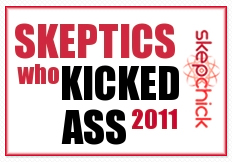What has become of UK politics?
A few weeks back on the Think Tank we heard the story of David Tredinnick, the UK Conservative MP who spent 700 quid of taxpayers money on astrology software. It turns out he believes in all kinds of woo, including such tosh as, depending on the phase of the moon, “surgeons will not operate because blood clotting is not effective and the police have to put more people on the street”. He is also a big fan of homeopathy, and in response to the recent Committee on Science and Technology evidence checks findings about homeopathy, he submitted four early day motions (EDMs) to the House of Commons for consideration.
For those non UK readers, EDMs are motions tabled by Members of Parliament for debate “on an early day” (namely an unspecific date in the future). EDMs cover all manner of subjects that the MP thinks parliament should be made aware of and possibly debate. They can address serious matters such as climate change, or trivial events such as the Pidgeon Bombs EDM which was tabled in the 2003–04 session of the UK Parliament. This EDM concerned itself with a disclosure by MI5 that it had proposed using pigeons as flying bombs World War II. According to Wikipedia, the motion condemned the proposal, describing humans as “obscene, perverted, cruel, uncivilised and lethal”, and proposed that the House “looks forward to the day when the inevitable asteroid slams into the Earth and wipes them out thus giving nature the opportunity to start again”. (I realise this is Wikipedia but I sincerely hope this is true).
EDMs remain open for signature for the duration of the parliamentary session but are rarely ever signed by all 400 MPs and few make it to the floor for debate.
Despite the recent evidence check and the damning findings that the National Health Service should cease funding homeopathy, no further clinical trials of homeopathy should be conducted, evidence shows homeopathy doesn’t work, explanations for why homeopathy works are “scientifically implausible”, David Tedinnick was just busting to share some “new information” about homeopathy! So he tabled four EDMs, one citing “new research” concerning homeopathy as a effective treatment for breast cancer (which came out prior to the evidence check BTW) (EDM285), for depression (EDM286) and also insomnia (EDM287). Tredinnick also objected to the British medical association’s recent public statements that homeopathy is witch craft and calling for no further commissioning of, nor funding for, homeopathic remedies in the NHS (EDM284).
He cited published peer reviewed studies as evidence for his claims. One of them I happen to know very well, since I spent the better part of a Saturday back in February debunking the entire paper. The reason I did this was because Richard Saunders had received an e-alert from Homeopathy Plus! With a headline screaming “Homeopathy as good as chemotherapy for breast cancer and non-toxic!”. Which is a pretty extraordinary claim for some magic water. And also likely to be complete bollocks (I won’t keep you in suspense – it is).
EDM285 is reproduced below.
That this House welcomes the study published in the International Journal of Oncology, 2010 Feb; 36(2): 395-403 which revealed that homeopathic remedies have a beneficial effect on breast cancer cells; notes that researchers at the University of Texas conducted an in vitro study to determine whether products prescribed by a clinic in India have any effect on breast cancer cell lines; further notes that the researchers studied four ultra-diluted remedies, carcinosin, phytolacca, conium and thuja against two human breast adenocarcinoma cell lines, MCF-7 and MDA-MB-231 and a cell line derived from immortalized normal human mammary epithelial cells, HMLE; observes that the remedies exerted preferential cytotoxic effects against the two breast cancer cell lines, causing cell cycle delay/arrest and apoptosis; believes that the findings demonstrate biological activity of these natural products when presented at ultra-diluted doses; and calls for further research in this important area.
Yeah, I guess Tredinnick, like Homeopathy Plus either didn’t read the entire paper or doesn’t understand how to interpret the scientific literature cause this aint what I gleaned from the paper.
So the Twitterverse was mobilised to gather rebuttals to these 3 papers. Once Dr Evan Harris had my blog and Orac’s from Science Blogs in his sticky fingers, Dr Julian Huppert got straight onto composing a rebuttal. And it is a joy to read.
So let’s see what became of EDM 285 once it Harris and Huppert had gone to town on it.
EDM285A1 now reads like this:
Line 2, leave out from `403′ to end and insert `as an example of the failure of adequate scientific peer review because the paper provides no statistical analysis to support any conclusion, indicates that the experimental control, 87 per cent. alcohol solution, was itself toxic to the cell cultures, does not illustrate or explain the different chromatographic profiles of the solvent and the test substances, and does not provide sufficient data to allow proper evaluation of the study; notes that the lead author has retired and runs a homeopathy website which falsely claims that homeopathy is as effective as a conventional chemotherapy agent, Taxol, in treating breast cancer; further notes that one of the authors, Alison Pawlus, has publicly disowned the paper; regrets that isolated poor-quality studies are cited by proponents of homeopathy to endorse dangerous and exploitative cancer-curing claims in the face of overwhelming weight of scientific evidence against them; and agrees with the conclusions of the Science and Technology Select Committee’s Fourth Report of Session 2009-10, Evidence Check 2: Homeopathy HC45 that putting patients through pointless further clinical trials, and the spending of scarce public sector funds on research into homeopathy cannot be justified.’.
The comment about Alison Pawlus, listed as an author on the study publicly disowning the paper is derived from a comment she left on my blog where she stated;
“As an unintentioned co-author on this study, I feel obligated to respond….”
Alison went onto say “…I asked to not be included because I did not think it was a sound study…”
And
“I believe this study demonstrated changes in alcohol percentages on cells rather than the efficacy of homeopathic medicine.”
The amendments to the EDMs constitute a marvellous result and are testament to the dedication of Dr Evan Harris and Dr Julian Huppert. The fact that this message got out so quickly is also a credit to the power of the blogosphere and twitterverse. In fact, this was how I originally got my hands on the full text of this article, by tweeting for someone to source it for me. Thanks @xtaldave!
But David Tedinnick is not the only one who has jumped to conclusions about the findings of this paper. I already mentioned Homeopathy Plus! making a giant leap in logic from “cells treated in culture” to “homeopathy is better than chemo for cancer.” Many others have picked up this meme and run with it, despite the fact that not even the paper itself makes this claim.
The only reference to a common cancer drug appears buried in the discussion and states, “Interestingly, the cytotoxic effect of two of the remedies investigated in this study, Carcinosinand Phytolacca, appeared similar to the activity of 0.12 ?M paclitaxel (Taxol), the most commonly used chemotherapeutic drug for breast cancer, when it was tested in the two adenocarcinoma cell lines investigated in this study in parallel experiments (data not shown)”.
I repeat, DATA NOT SHOWN. Interesting that homeopathy sympathisers can go from this, to homeopathy can cure cancer. But then facts, evidence and science never really did interest them much. As for David Tredinnick, well it seems he is not much interetsed either, as revealed in a debate between him and Dr Simon Singh BBC Radio 4. You can listen to the audio here.
You can also read two great stories about the loonie beliefs of David Tredinnick from The Guardian by Nature’s @AdamRutherford here and The Lay Scientist’s @mjrobbins here.
The entire exercise was summed up by tweeter @paulNUK2010 who relected; “How to get your scientific papers peer reviewed by experts in the field – get David Tredinnick to cite them in an EDM #homeopathyEDMs”.
So very true.
As I said in my original blog post, the journal that published this tosh has an impact factor of 2.234 but a fail factor of 10^23.
Sadly, these amendments do not mean the loonie EDMs have been thrown out. We still need MPs to show their support by signing the amended versions.
If you live in the UK, please write to your MP here. You will find a form letter to use for a guide here.






